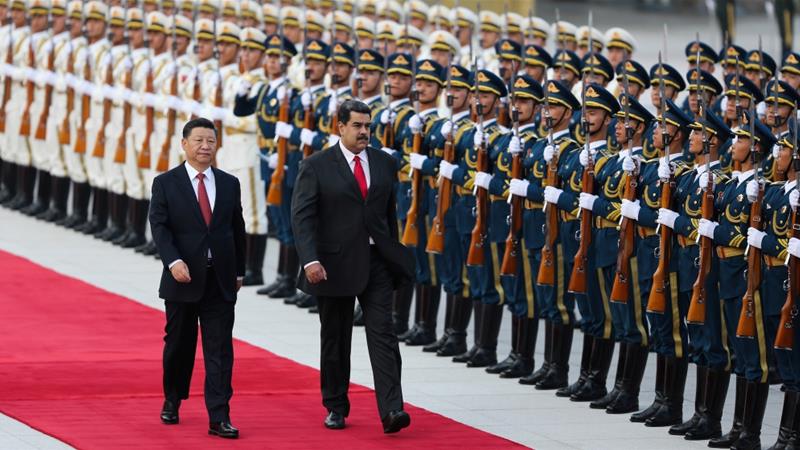China Will Determine the Future of Venezuela
BRICS, LATIN AMERICA AND THE CARIBBEAN, 22 Jul 2019
Carlos Eduardo Pina – Al Jazeera
There are a number of reasons why Beijing continues to back Maduro’s government despite suffering financial losses.
14 Jul 2019 – On January 23, when US-backed opposition leader Juan Guaido declared himself interim president of Venezuela, he thought deposing President Nicolas Maduro from power would be easy.
He had a simple, three-thronged plan: declare Maduro’s presidency illegitimate by exposing the irregularities in the election that brought him to power, establish a transition government, and hold new elections that would bring the opposition to power.
However, almost six months on, Guaido is not any closer to loosening Maduro’s grasp on power. The main reason behind the 35-year-old opposition leader’s failure to bring Maduro down is the support that some prominent international powers, most significantly China, have given to the Venezuelan government.
China, a global power with significant financial and military ties to Venezuela, refused to recognise Guaido’s presidency on the grounds that doing so would amount to intervening in the internal affairs of a sovereign state.
Guaido’s foreign backers, the US chief among them, interpreted China’s stance on the issue as support for Maduro and his government and even implied that China is responsible for the ongoing crisis in Venezuela. On April 13, for example, during a visit to Chile, US Secretary of State Mike Pompeo said that he believes “China’s bankrolling of the Maduro regime helped precipitate and prolong the crisis in that country.” More recently, US Southern Command Chief Admiral Craig Faller claimed that Chinese support to Venezuela in the form of surveillance technology has been “used to monitor and repress the Venezuelan people”.
Meanwhile, acknowledging the important role China has been playing in the ongoing crisis, Guaido started a campaign to convince Beijing to end its support for the Chavista government.
Only a day after Pompeo’s criticism of China, the self-declared interim president published an op-ed in Bloomberg titled, Why China Should Switch Sides in Venezuela. In the article, Guaido argued that the opposition government would protect China’s interests and investments better than the Chavistas and pledged to give China new financial incentives in Venezuela if it agrees to seize its support to the current government.
Guaido’s article and Pompeo’s statements only confirm a fact many Venezuela watchers have been aware of for a very long time: China’s political stance is the key factor that will determine the future of Venezuela.
Why is Venezuela important to China?
While Beijing is an indispensable economic and political partner to Caracas, the Latin American nation is also very important to China.
China views the oil-rich socialist country as a significant trading partner and a geopolitical ally in its main political and economic rival US’s backyard. Moreover, the investments Beijing made in the country in the last couple of decades made Venezuela an important component in China’s future economic prosperity and energy security.
Cooperation between China and Venezuela began to grow significantly following Hugo Chavez’ ascent to power in 1999. Following Chavez’ death in 2013, the good relations between the two nations continued under Maduro’s presidency. From 2000 to 2018, the trade between the two countries increased more than 20-fold and the value of Chinese direct investment to the country reached $6bn. Meanwhile, the total value of Chinese loans to Venezuela surpassed the $60bn mark.
The majority of China’s loans to and investments in Venezuela have been related to the oil sector. In 2007, Beijing created the China-Venezuelan Joint Fund (FCCV), which allowed Venezuela to receive loans from China in tranches of up to five billion dollars, and pay them with shipments of crude oil. The FCCV allowed the Chinese government to get involved in oil production in the Orinoco Oil Belt, which is considered to be the world’s largest oil reservoir.
Why is China still standing by Maduro?
Having accumulated a significant amount of debt over the past two decades, Venezuela is struggling to repay Chinese loans, as its oil production continues to decline due to the ongoing crisis casts. This puts China’s economy and energy security at risk. Meanwhile, the majority of Chinese direct investments in Venezuela have either been put on hold or completely abandoned due to the unfavourable conditions for business in the country.
Acknowledging the risk it is currently facing in Venezuela, China reevaluated its objectives and limited the issuing of new infrastructure loans in the country. It focused on financing mixed enterprises that it has created in partnership with Venezuela’s state-owned energy firm Petroleos de Venezuela SA. It has also increased the mechanisms of control over the final use of the credit issued to Caracas.
Despite these challenges and the risk of suffering potential economic losses, Beijing continues to stand by the Maduro government, at least for now. The official reason behind this position is that the Chinese government is not willing to intervene in a sovereign nation’s internal affairs. However, this cannot explain its motivation to continue supporting the embattled Venezuelan president at a great cost to its economy.
Unofficially, there are a number of other reasons. Beijing is still siding with the Venezuelan government because it believes having a like-minded socialist ally in the US’ backyard is more important than any costs it may incur as a result of the ongoing Venezuelan crisis.
Additionally, “south-south cooperation” is currently one of the mainstays of China’s foreign policy and Beijing does not want to risk its reputation as a leading trading partner and trustworthy investor in the global south by siding with a US-backed opposition group and supporting its attempt to unlawfully topple the legitimate government of a sovereign country.
Moreover, despite Guaido’s best efforts, China has no reason to trust the Venezuelan opposition. For years, the position of the opposition regarding Venezuelan debt commitments to China has been ambiguous. Today, Beijing has no reason to believe that after taking power the opposition would agree to pay back the debts accumulated under Chavista governments.
The Venezuelan opposition’s close relations with the Trump administration is another reason why China continues to support Maduro. The Chinese government does not believe Venezuelan elites who appear to be under the tutelage of the Trump White House would protect its interests in Venezuela or in the wider region.
China’s position, however, is not set in stone. Guaido and his supporters can still convince the Chinese to change their mind by distancing themselves from the Trump administration and providing some form of reassurances that they would honour Venezuela’s financial commitments to China.
If the opposition indeed finds a way to win the trust of Beijing, it would have a much better chance at challenging the Chavistas and eventually taking power in Venezuela.
___________________________________________________
Carlos Eduardo Pina is a Venezuelan political scientist.
Go to Original – aljazeera.com
Tags: BRICS, China, Economics, Geopolitics, Imperialism, International Relations, Latin America Caribbean, Politics, Power, Sanctions, USA, Venezuela, West
DISCLAIMER: The statements, views and opinions expressed in pieces republished here are solely those of the authors and do not necessarily represent those of TMS. In accordance with title 17 U.S.C. section 107, this material is distributed without profit to those who have expressed a prior interest in receiving the included information for research and educational purposes. TMS has no affiliation whatsoever with the originator of this article nor is TMS endorsed or sponsored by the originator. “GO TO ORIGINAL” links are provided as a convenience to our readers and allow for verification of authenticity. However, as originating pages are often updated by their originating host sites, the versions posted may not match the versions our readers view when clicking the “GO TO ORIGINAL” links. This site contains copyrighted material the use of which has not always been specifically authorized by the copyright owner. We are making such material available in our efforts to advance understanding of environmental, political, human rights, economic, democracy, scientific, and social justice issues, etc. We believe this constitutes a ‘fair use’ of any such copyrighted material as provided for in section 107 of the US Copyright Law. In accordance with Title 17 U.S.C. Section 107, the material on this site is distributed without profit to those who have expressed a prior interest in receiving the included information for research and educational purposes. For more information go to: http://www.law.cornell.edu/uscode/17/107.shtml. If you wish to use copyrighted material from this site for purposes of your own that go beyond ‘fair use’, you must obtain permission from the copyright owner.
Read more
Click here to go to the current weekly digest or pick another article:
BRICS:
- The “BRICS Sovereigns” vs the “Globalist Oligarchy”
- Cuba Joining BRICS Is a Lifeboat for Its Economy
- BRICS and G20 Value Platforms: A Comparative Analysis
LATIN AMERICA AND THE CARIBBEAN:

